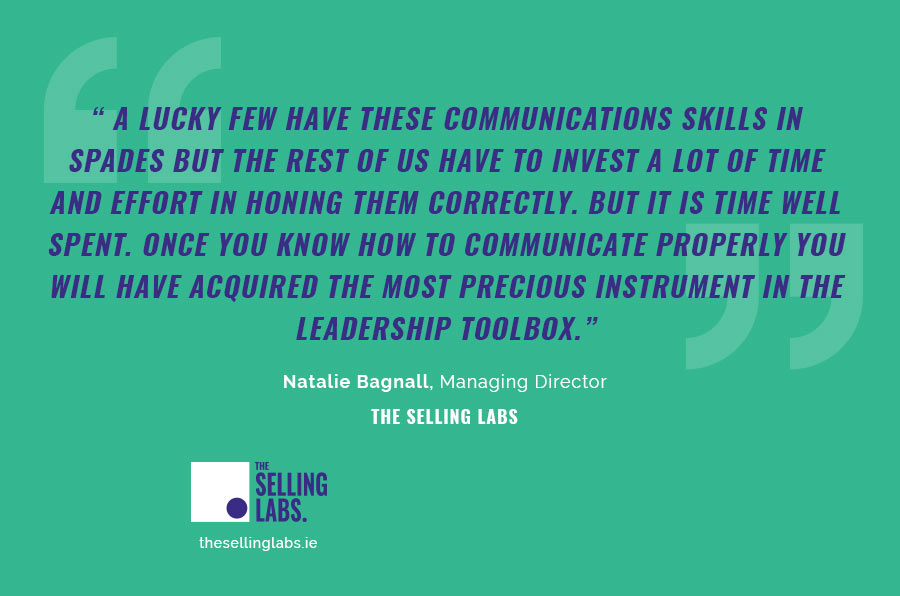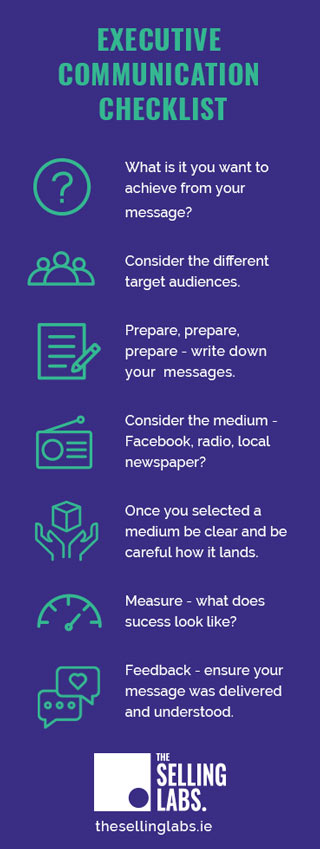Throughout the course of history, there are very few examples of great leaders who were unable to communicate and the reason for this is pretty simple: no-one can be expected to follow a cause if they don’t know what their leader stands for in the first place. Whether you’re delivering a high-level presentation to a large crowd or writing a tricky email to one person, being clear about what you are saying and how it is heard is a mandatory requirement for all those in the business of leading teams and why executive communication coaching is so sought after.
On Expert Sales Tips
Get regular updates delivered straight to your inbox with expert sales tips for tech & SaaS companies. Enter your email below and start to increase your sales now.
Importance of Executive Communication
A lucky few have these communications skills in spades but the rest of us have to invest a lot of time and effort in honing them correctly. But it is time well spent. Once you know how to communicate properly you will have acquired the most precious instrument in the leadership toolbox.
A good way to approach your communications effort is to liken it to a marketing strategy where the message you want to get across becomes the product that you need to sell. When a marketing director launches a new product, considerable effort is invested in getting it right from the start before it is sent to the market place as skilfully, stylishly and efficiently as possible. A similar approach to your communications will help to power your leadership style in a clear, concise and meaningful way to your various stakeholders and audiences.

Executive Communication Example
An example. Let’s say you want to introduce a new company-wide mentoring programme for inside sales where managers will be offered the opportunity to be trained up as mentors and asked to help junior employees with their career development. Your first task is to decide the objective of the announcement – in this case, it might be to create excitement about the opportunity and drive engagement in sign-ups. It’s likely the announcement will be greeted positively – the company is offering a way to learn a new skill.
You select your target market for the announcement – the mentors, their managers and the wider company. You write the content for the message – positive language to build excitement, encourage participation to help out others and build a new leadership skill into the bargain.
You select your media: you want as many people to hear about it as possible: company all-hands, social media follow-ups, managers briefed to encourage sign-up.
The campaign’s success will be evaluated by monitoring the number of mentoring partnerships created and ultimately the effect on retention and career development.
All runs smoothly and the project is implemented successfully. Lucky you!
The Importance of Feedback
Because it’s rarely as easy as that. Sometimes there is a backlash from some quarter. Some people may be thrilled with your plan, others might complain that your criteria for mentor selection wasn’t clear, that certain departments are excluded from participating, that there is a hidden agenda, that the programme isn’t fair? Are these criticisms correct or were you just unclear about what you were trying to say? Were you being underhanded or were you being misunderstood. Are you being fair or not? Should you have gone about it this way? Have your best intentions backfired on you?
It’s hard to know the answers to these questions yourself but at least you now have the feedback from those you were communicating with, those whose support you need to implement the plan. In the same way that understanding sales metrics can help increase your sales understanding feedback on your leadership can help with your communication. Your well-intended message went down the line without a hitch but came back up again with observations and caveats attached. This is a good thing because you now have a two-way flow of communications, a dialogue with your audience, and that priceless resource holds the key to resolving the issue and getting the plan right.
Your follow-up communication should go a long way to help you reach your goal. Pay good attention to getting it right!

Executive Communication Checklist
From providing leaders with Executive Communication Coaching here at The Selling Labs we know a thing or two about what a it takes to be a good communication. The below is a checklist to ensure great executive communication.
- What is it you want to achieve from your message, what’s your goal?
- Consider the different target audiences and understand what makes them tick. Get to know and understand those with whom you are communicating
- Prepare, prepare, prepare: write down your messages before you share them and consider the words, tone and delivery. Never wing it. Get your facts straight! Read back over what you’ve written and read it out loud. Practice on someone.
- Consider the medium – should this really be on Facebook or Tik Tok. How about the local newspaper or the radio. What you communicate relies as much on how it is received as by its tone and content.
- When you use the selected medium be clear and be careful how it lands. Don’t SHOUT by using CAPITAL LETTERS! Don’t get into an email exchange if the topic is heated … and, for heaven sake, go easy on the emojis!
- Think about what success looks like – how will you know if your message landed? How will you establish if the time and effort was worth it?
- Communication is a two-way process, send the message in the right medium, ensure its delivered and understood and get a response. Effective communication needs feedback

How Can Executive Communication Coaching Help?
It’s difficult to ascertain how good a communicator you are. Unless you work in a culture where feedback is regularly offered, you may not be aware of how you come across, either in writing or in person. This is where executive communication coaching can help – it helps surface the fear of taking the stage or it helps build a muscle of regular compelling communication. A coach provides you with confidential private space to practice and to reflect on progress. To find out more about our executive communication coaching then schedule a free call or contact us online now.
On Expert Sales Tips
Get regular updates delivered straight to your inbox with expert sales tips for tech & SaaS companies. Enter your email below and start to increase your sales now.



